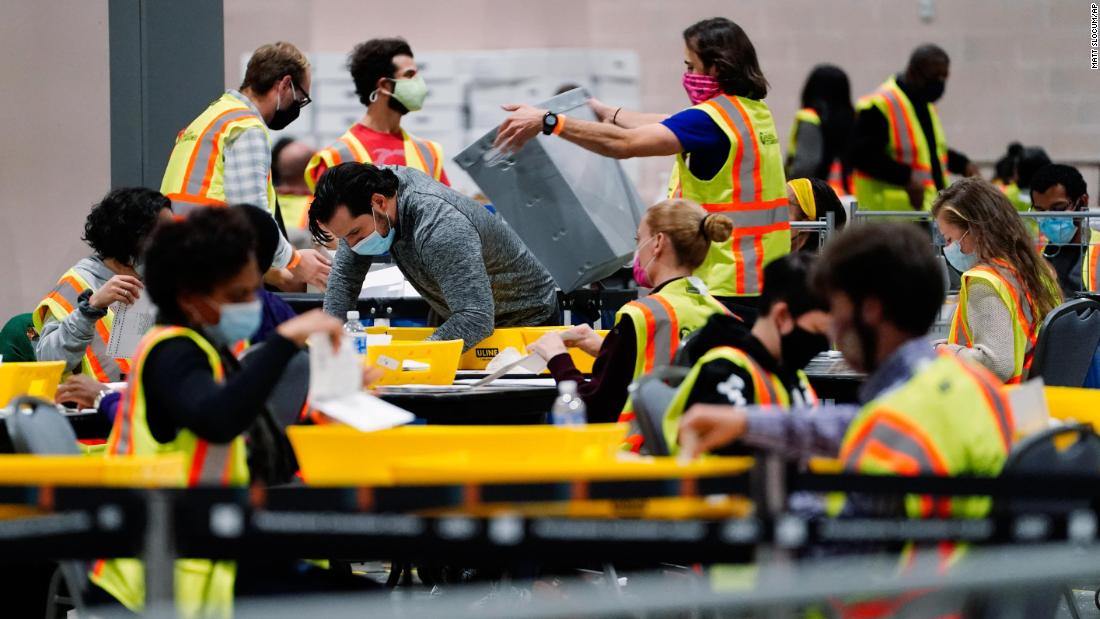
First, months ago, he began falsely portraying mail-in ballots as rife with fraud. Second, he falsely claimed that Democratic governors who don't like him are in charge of ballot-counting. Third, he falsely argued that there is something nefarious and even perhaps illegal about the normal practice of counting votes after Election Day.
All of this nonsense, the dozens of voting-related lies we've had to debunk over and over and over, appeared to be in service of this current moment -- a close election in which he could try to turn the seeds of doubt he had systematically planted in supporters' minds into full-blown rejection of his possible defeat.
Trump launched the plan into action in the early hours of Wednesday morning, delivering a wildly inaccurate White House address in which he baselessly alleged he had already won and baselessly alleged a fraud was being perpetrated against him. Then he retreated to Twitter -- on which almost everything said for the rest of the day was wrong.
How serially wrong? As of 5:30 PM, Twitter had affixed some sort of fact check caution label to six of his Wednesday tweets -- and you could make a good argument that some of the others deserved the same treatment.
Trump tweeted: "They are working hard to make up 500,000 vote advantage in Pennsylvania disappear — ASAP. Likewise, Michigan and others!"
False. Counties were simply counting the votes. Mail-in votes, which generally favored Democrats, were being counted after Election Day in some states, such as Pennsylvania, because Republican state legislators there would not allow the counting process to begin as the votes arrived.
Trump tweeted that "surprise ballot dumps" were making his initial leads in key state "magically disappear."
False. There was no "surprise" -- votes were, again, simply being counted -- and ballots were not being actually dumped anywhere. When political observers tweet about "ballot dumps," they are not talking about ballots being discarded. Rather, they are referring to moments in which a large quantity of newly counted votes are entered into, or "dumped" into, the public totals.
Trump tweeted, "We are up BIG, but they are trying to STEAL the Election. We will never let them do it. Votes cannot be cast after the Polls are closed!"
Once more: entirely false. Nobody was trying to steal anything; there was no evidence of election fraud. And votes were simply being counted after the polls closed, not cast after the polls closed.
Late on Wednesday afternoon, Trump tried an especially feeble bit of deception: proclaiming that "we have claimed, for Electoral Vote purposes," Pennsylvania, Georgia, and North Carolina. (States are not Trump's to "claim" via Twitter. The votes decide who wins them.) Trump then added: "Additionally, we hereby claim the State of Michigan if, in fact, there was a large number of secretly dumped ballots as has been widely reported!"
CNN and other media outlets had already projected that Trump's opponent, former Vice President Joe Biden, would win Michigan. (Pennsylvania, Georgia and North Carolina remained too close to call at the time.) And there was no evidence of "a large number of secretly dumped ballots," there or elsewhere; he might have been referring to a typo by a Michigan county, quickly corrected, that briefly appeared to give Biden extra votes.
It wasn't just Trump making phony assertions on Wednesday. As so often over the last four years, he was being aided by an entire ecosystem of pro-Trump misinformation.
The President's son Eric Trump, White House press secretary Kayleigh McEnany and campaign manager Bill Stepien, among other allies, made baseless afternoon declarations that Trump had already won Pennsylvania.
Matt Schlapp, chair of the American Conservative Union and husband of Trump campaign senior adviser Mercedes Schlapp, promoted a baseless conspiracy theory involving Arizona, Trump voters and Sharpie markers.
And Trump lawyer Rudy Giuliani participated in a campaign event in Philadelphia during which he delivered a barrage of conspiratorial false statements. Giuliani's comments were so absurd we are saving them for a separate fact check.
Dishonesty has been a defining feature of the Trump presidency from the start, and it was a central component of his re-election campaign. It was perhaps fitting that, with his possible path to 270 electoral votes getting smaller and smaller, he and his surrogates turned to the approach he knows best.
"news" - Google News
November 05, 2020 at 08:46AM
https://ift.tt/32vCh1Z
Fact check: Almost everything Trump has said after Election Day is wrong - CNN
"news" - Google News
https://ift.tt/2DACPId
https://ift.tt/2Wh3f9n
Bagikan Berita Ini














0 Response to "Fact check: Almost everything Trump has said after Election Day is wrong - CNN"
Post a Comment